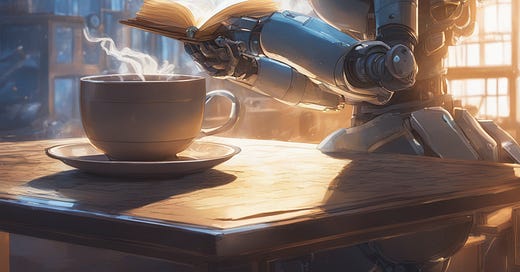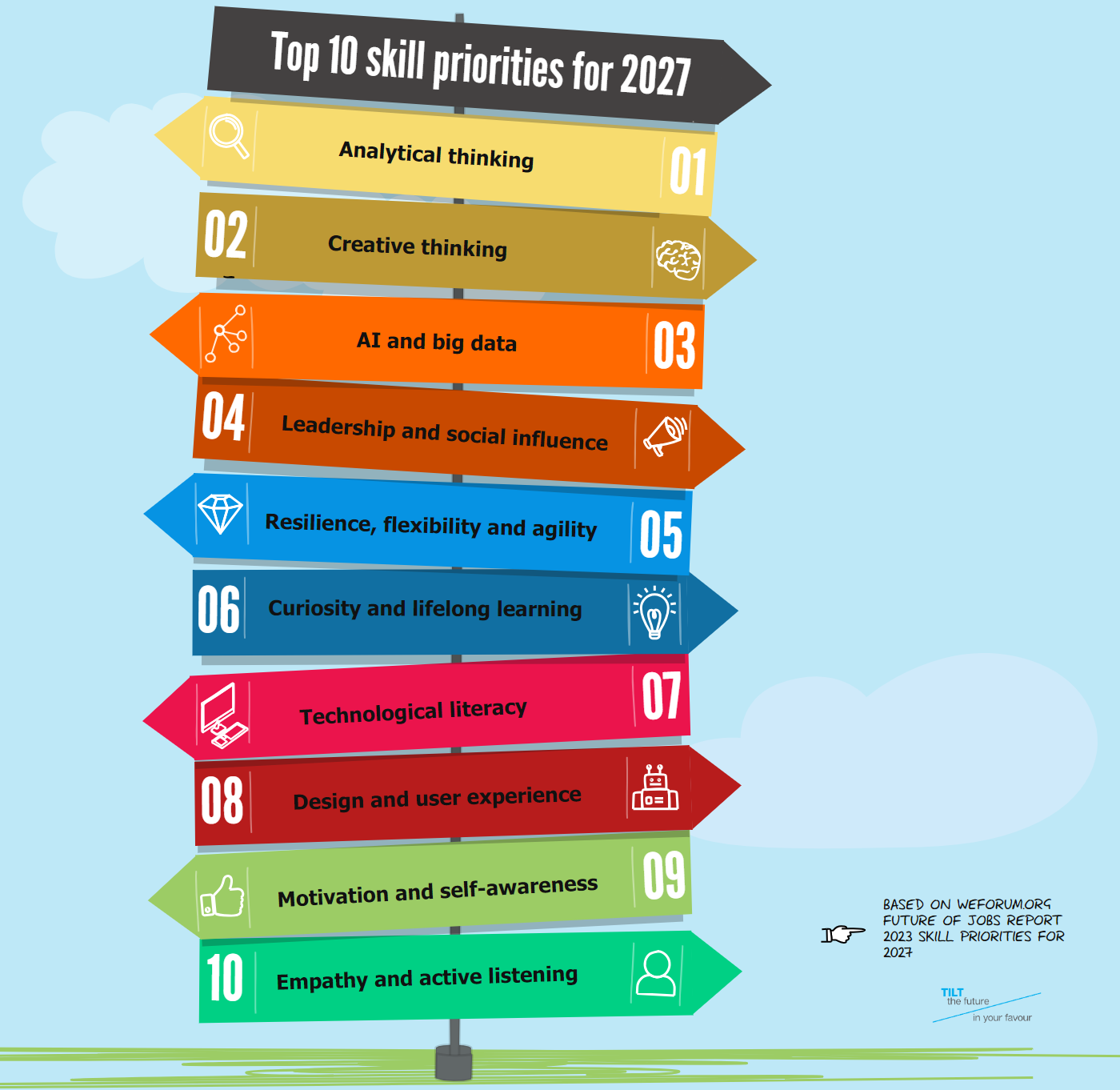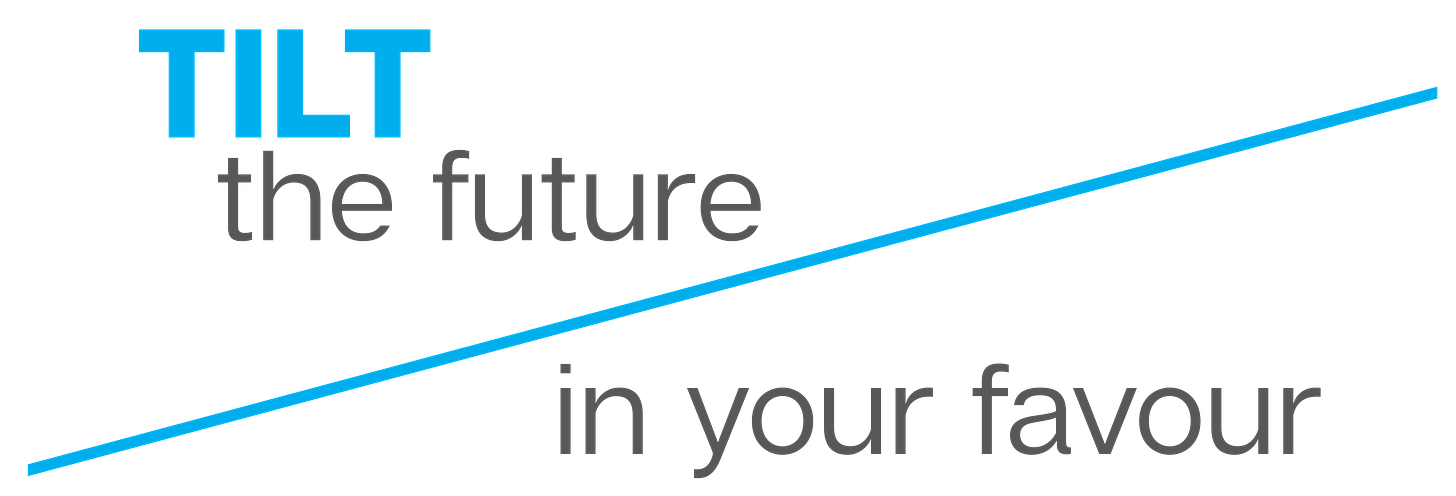Is STEAM GenZ's Response To a STEM Education?
E109: Debating the case for Humanities Studies in a STEM-centric economy. Part 1 of 2
“Can I get a recording of this to playback to parents?” This essay started with a great conversation at Roundtable 3 between Canadian guidance counselors and US Admissions Officers (and me as parent ambassador). “How do I explain to parents that a Liberal Arts education may be a good option?” We were attending the recent Prepskills U.S. College Expo Counsellor Breakfast, run by Tilt member Joanna Severino. [Connect with Prepskills if you are a Canadian student, athlete, parent, or educator interested in discovering how the admissions process works south of the border.]
TL;DR:
STEM or STEAM
I was facing a conundrum. My son was considering a degree at a liberal arts school. "Impossible! Dad is an Engineer. I’m a CompSci major." We are both products of a STEM education and we’ve enjoyed interesting STEM-centric careers.
As the sun sets on the Industrial Era, conventional wisdom holds that a STEM education is a more reliable ramp into an entry-level position and a career. Like most STEM-educated immigrant parents, that was my priority for my boy. It would take a lot to shift my thinking.
STEM - Science Technology Engineering Math
But I’m also a Futurist who focuses on the Future of Work - a future where our relationship with information has changed dramatically. Previously those who could reel off dates and figures at will were highly valued. Doctors. Lawyers. Professors. Apps and databases are rapidly replacing those functions. “If you do the same things, in the same order three times in a row, it can become a program routine or a robot function,” I remind my audiences. Robots and routines were originally developed to do the ‘boring stuff’.
With the advent of the Internet and the World Wide Web, our access to information has been democratized. The daily universe of data collected is expected to be 463 exabytes (18 0s) by 2025. The entry-level challenge now is to churn through this volume, distinguish fake news from real data, decide if it is pertinent, and then use it to make complex connections and decisions. In this future the rapidly advancing AI engine will quickly reduce the shelf life of purely technical skills.
It appears that the humanities/arts — including but not limited to languages, anthropology, mythology, history, and philosophy — are a great sandbox within which to develop and hone the broader skill of dealing with ambiguity.
STEAM - Science Technology Engineering Arts Math
The new world of work is one where we need a good balance of STEM and Humanities skills. Technology is clearly a core driver and a very necessary element for the next generation of progress. But are we at a point where we risk the human in humanity if we ignore the Humanities?
Is a blend - STEAM - the way forward?
Thought A: GenZ thinks in continuums
“STEM or Arts?”
“Nerd or Jock?”
“Male or Female?”
”Metaverse or Real Life?”
“Why OR?,” they ask back, “Isn’t it a continuum?”
The problem, I realized, lies in my generation - the Industrial Era parents of these new Explorers. We are the sorters. We grew up with discrete choices and hard boundaries. In our day, Engineering students became Engineers. Medical students became Doctors and Surgeons. Language and PolSci majors became journalists. All delineations that are rapidly blurring. Prior to the democratization of information, these career paths demanded rigor and rewarded you for knowing oodles of facts. A lot of the entry-level tasks in the space are now being replaced by routines: AI, ChatGPT - and if they are tasks that require repetitious precision, by robots1.
GenZ’s instinct to include humanities classes alongside STEM is an intuitive response to the world unraveling before them, a world that is in the process of reinventing itself. While that is in progress, the way ahead and the methods to get there are ambiguous. The new World of Work (Future of Work) is still under construction. We are at the beginning - pushing at the elastic edges of the boxes called remote work, gig work, and portfolio careers.
Everywhere we turn, established frameworks are ripe for reinvention. Is this possible? It has happened before: Think “The earth is flat”. Think "Man cannot fly." Think "Gravity".
With our generation's reliable roadmaps being torn and tossed to the wayside, this younger generation of students, workers, and managers has to navigate by compass. It turns out that courses in the humanities — philosophy, language, and anthropology — are great sandboxes for dealing with ambiguity. They teach you how to think, in a way that is less formulaic than the Sciences. The ability to synthesize and create connections between large bodies of work in different disciplines becomes a 21st-century skill.
GenZ does not debate STEM or Humanities. Their answer is STEAM - where a healthy dose of obtuse creativity from the Arts and Humanities blends with the punctiliousness of technical skills necessary to navigate today’s landscape. The ability to deal with rapid change balances the considerations of long-term consequences. Ying/Yang.
Thought B: Humanities classes teach us to process ambiguity
Recent studies by David Deming (Harvard Professor on Education and Economics) indicate that a liberal arts/humanities degree gives their students a better ability to collate and synthesize huge amounts of data/information. (reference back to 463 exabytes of data daily).
We know that complex problem-solving and critical thinking are key 21st-century skills. In a world where technical knowhow has a rapidly decaying shelf life, the ability to hold multiple points of view, to reinvent, to debate your point, to absorb and learn from those around you (learn how to learn), critical thinking, problem solving and leadership become the more valuable 21st-century skills. In a rapidly changing job market dealing with incredible complexity, surely these are profoundly important skills to incorporate into any post-secondary study.
I grew up as a COBOL-era coder. The machine did exactly what I told it. The first time. Bugs and all. This is very different from philosophy, poetry, and essays where the results are often open to interpretation. [If you ever wonder why immigrants gravitate towards STEM disciplines, it is because Math and Science translate the same way the world over, making them easily transferable.]
Today’s STEM student is at the forefront of making technology more “human”. How do we create a chatbot that intuitively scans the available database of solutions from the 18 different ways it is asked “How do I switch from a data-only telco package to best services plan”? Or build a robot with a gentle touch to support aging Japanese? We see more multi-disciplinary teams where coders sit alongside jazz musicians. Interested in the many ways we can create new careers by blending STEM with Humanities interests? Check the links below for some articles I wrote pre-pandemic.2
In the Future of Work, we will see fewer of the traditional jobs, but more opportunities to work across disciplines. Successful candidates will be able to use previously learned skills and deploy them for new solutions - a portfolio of skills mixed and blended to solve the problem at hand.
The Humanities also teach us how to engage in healthy debate, how to consider nuance and play with imagination. If you are in Explorer mode (rather than Google Maps “Move to the right lane. In 200m take the next right.”) you need to be able to scan the horizon and think holistically - “see the forest for the trees”. It helps to hold a healthy level of skepticism, but also be willing to embrace risk. Both these are 21st-century skills that make an emerging adult more appealing to a prospective manager.
Thought C: Humanities graduates are employable
Dealing with the elephant in the room. Many parents have steered their young adults away from Liberal Arts degrees because they may be immediately “unemployable”. (I was one of those parents.) Pre-pandemic stats did prove them out3. To some degree.
However, studies done before the pandemic indicated that while STEM gave students a faster ramp into a career, more C-level positions were held by humanities graduates. [I will keep searching for updated studies that may reflect if there has been a switch toward STEM given the prevalent startup culture.] This may be because they bring team building, complex communication, and idea synthesis. At the higher levels of management, complexity rules: we deal with extended amounts of information, situations requiring negotiation as well as increased levels of complex problem-solving. Tim Cook is no longer dealing with code as the head of Apple. His universe is geopolitics, sourcing, and a myriad decisions that have to be resolved.
We are moving out of a job economy and into a skill economy. In today's world, more managers are seeking candidates who can demonstrate their ability to be flexible in their thinking and reskilling, incorporate technology in their solutions, and consider the holistic process. When job-searching sell your skills4 accordingly.
Make your own opportunities
Beyond that, STEAM graduates - either because they blend two subsequent degrees/learnings or incorporated humanities experiences into their STEM degree - are able to move from a “job” mentality to a “skills” mentality. They bring their broad range of experiences to help solve the problem at hand, sometimes creating niche careers for themselves.
My pandemic-era favourite is local Torontonian “mad scientist” Kaya Ogruce who concocts delicious gelatos at Death in Venice. He graduated ChemEng from the University of Toronto and quickly found a job creating synthetic butter. But it felt wrong. So he returned to culinary school. He started lobbying local grocery stores to send him all their bruised fruit, and from that concocted amazing award-winning short-run flavours, steering food away from the landfill. Google his name and you will be treated to the full story as well as a list of some out-there flavours - black garlic? crickets? pandan? My favs: Ricotta, Lemon, Rosemary / Smoked Hay+Goats Milk / Roasted Parsnip & Maple Syrup. Just google the site and be amazed. If you are in the GTA (Toronto and the Golden Horseshoe), you have to stop by their mad laboratory on Queen Street!
Now is not the moment for OR
I have a lot more to share, but I’m crossing 2000 words. Part 2 is a more philosophical slant on this conversation. Please weigh in with your thoughts and send me relevant links in the comments or DMs. Together we can co-create a better resource for students and parents.
I’m going to reprint the end of an essay ‘Blend Art with Science and Technology to Create the Perfect Job I wrote in 2018 because the interim five years prove that this is still relevant today:
Steam is created when water is heated, creating an increasing number of excited bubbles which expand. Steam has been harnessed to create energy that powers everything from a pump to a steam engine. A simplistic analogy. But the operative words here are EXCITED, EXPAND and ENERGY.
New opportunities require an environment of exploration. Knowledge knocks at itself, looking for a use and application of a skill we developed in a different dimension.What came through loud and clear:
everyone should become computer knowledgeable and literate, regardless of age, regardless of discipline. This is AND, not OR.
you have to be willing to continue learning and seeking new knowledge
it does not matter where you start, but you should expect to reinvent yourself and seize opportunities that are presented
learn how to learn
I've said it before the best idea can come from anyone, anywhere, at any time. So long as we create opportunities for diversity of thoughts and disciplines to bump into each other, creating momentum and steam.
I want to thank the army of peer editors in the current Write of Passage cohort who asked searching questions to help this essay coalesce. Here are a few of the many names (and their publications):
by ,, Ethicist by Monica Magalhaes, Machine Learning exploring human intelligence by Lalith Narayan, by Andriy Kulak, Masha Birkby, and invaluable feedback from GenZ writers Ben Griffin-Sniffen and ‘s GenZ Baxter Blackwood.Thanks to
for showing me the autogenerate visuals in Substack! It was a lot of fun.Welcome to each of our new members of Tribe Tilt joining us from India, across the USA, and Germany. You bring your curiosity, which we welcome.
This small community believes in the best of humanity - connecting people, sharing ideas, and exploring thoughts respectfully. We support each other. We believe we can make a difference to the people and places that are precious to us. And that the best idea can come from anyone, anywhere, at any time.
Is this your first visit to Tilt the Future? Come join our Tribe Tilt by hitting this button below:
I offer live and virtual keynotes on the Future of Work, and how we raise the leaders of 2050 and 2070. DM me if you are curious.
See you next week. Stay healthy. From there all else becomes possible.
Karena
Have you seen a robot perform “surgery” on a grape?
How technologists have been interacting with artists to develop better AI Feb 2018
Blend Art with Science to Create the Perfect Job: Six professionals with a STEAM education, including an astrophysicist who uses music to explain new orbits around TRAPPIST-1 March 2018
some interesting reading:
https://www.insidehighered.com/news/2020/01/14/long-term-look-return-investment-reveals-positive-indicators-liberal-arts
https://time.com/3964415/ceo-degree-liberal-arts/
https://www.forbes.com/sites/sergeiklebnikov/2015/06/19/liberal-arts-vs-stem-the-right-degrees-the-wrong-debate/?sh=3361f79b7bbe







I have degrees in engineering and fine arts, which I guess means I was a STEAM before it was cool ~ who knew? With that in mind, I agree wholeheartedly that it's critical to learn how to learn. But I wonder: can curiosity/inquisitiveness be taught, too?
I love the connection you draw between steam and actual steam 🤯